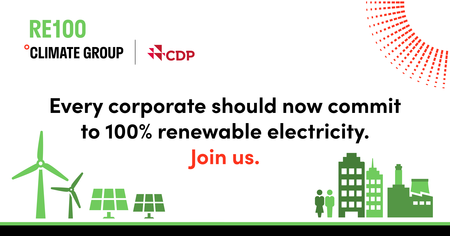This month (April) sees the landmark of 300 companies having joined RE100 - the energy initiative for business where the '100' means a commitment to buying 100% renewable electricity. The latest cohort of RE100 members highlights the diversity of this extraordinary business movement. From the global healthcare company Novartis to the Dutch brewer Heineken, and from the South Korean-based energy consultancy LG Energy to the Japanese electronics business Epson. These are large organisations driving emissions down - and fast - across multiple sectors and regions of the world.
The emergence of RE100 is a beacon of the remarkable transition that has happened in the energy landscape over the last decade. And at the heart of this change has been a rapid shift in the cost of renewable energy. A survey of RE100 members in September last year found that almost 70% of respondents cited cost savings as a driver for switching to 100% renewable electricity.
As companies' awareness of the impacts of climate change has grown, and with the opportunity to save money from wind and solar increasingly evident, buying renewables has moved from the fringe of corporate social responsibility practice to become a core element for business in securing their energy needs whilst driving down emissions and building positive relationships with employees, customers, investors and governments. When surveyed, 99% of our members who responded, highlighted CSR and driving down greenhouse gas emissions as the main reasons as to why they are committed to switching to renewable electricity followed by better customer satisfaction (92%) and improved air quality (77%).
What's increasingly clear is that this is real, tangible action that is strategic, commercially grounded, and focused on results. Despite the challenge of Covid-19, these companies are making progress on buying renewables, with more than 77 RE100 members already sourcing over 90% renewable power, and more than 40% of total electricity usage across the membership coming from renewables. That's double the proportion of renewables in the mix compared to 2015.
These companies are also pushing the boundaries of energy procurement, with over a quarter of renewable power being sourced by members coming from Power Purchase Agreements (PPAs) that bring additional renewable energy to the grid. Self-generation is also common, with almost 60% of members producing some renewable electricity for their own consumption.
None of these advances were certain to happen and when the RE100 campaign was launched by the Climate Group alongside our partner CDP just seven years ago, it required the determination and vision of a few leading organisations to create the space for change.
Our founder members, Swiss Re and Ikea, set the tone with their ambitious and ground-breaking 100% commitments, providing the inspiration and confidence to pull in more and more high-profile organisations from across the rest of Europe and North America.
From this group of pioneers, the membership growth in RE100 is spreading globally, across South America, the Middle East, southern Africa and, most rapidly , in the Asia-Pacific region. RE100 can now count some of the biggest and well-known brand names in the world amongst its membership, from Apple and AstraZeneca to UBS and Unilever. This diverse and impactful group of businesses is sending us a clear message: there is a vast appetite for clean energy, and this needs to be available across all parts of the world, including for companies in their supply chain.
Yet whilst there is much to celebrate, companies' access to renewable electricity varies by region and so, crucially, they are limited in actually delivering on their commitments. From a campaign that began by celebrating the ambition and innovation of corporate leaders - and which has built a demand for renewable electricity amongst its members bigger than that of a G7 country - the work of RE100 is now focused on creating access for renewables in the most challenging markets worldwide.
This is our focus for the Climate Decade - a time in which our mission is more urgent than ever and where we need to accelerate the transition to zero carbon electricity grids. By committing to 100% renewable power, RE100 members are leading the way globally. But that's not enough - every major company now needs to step up. Businesses and policymakers must work together and governments worldwide need to provide affordable and reliable market access, so companies can source 100% renewable electricity.
100% is on its way, but the pace of change is not inevitable. Joining RE100 provides a way to accelerate the change so urgently needed in the world. It makes good business sense too.
"Since 2018, HEINEKEN has made major progresses at sourcing renewable electricity. We are very proud to brew in the largest solar-powered brewery and have signed one of the largest European PPA through a consortium. Joining RE100 is a milestone in our 2030 net-zero journey"
Petra Hissink, Global Sustainability Director, Heineken
"Epson is proud to join RE100 at this special time. Joining this important initiative not only expresses our strong commitment to 100% renewable electricity and to achieving the Paris Agreement goals, but encourages our customers and business partners to also make the switch. We hope to use this opportunity to work with partners worldwide to help them achieve this."
Yasunori Ogawa, Global President, Epson
"Environmental sustainability is fully aligned with our purpose to reimagine medicine to improve and extend people's lives. Our journey to be carbon neutral across our entire value chain by 2030, includes a strong commitment to energy efficiency and renewable energy solutions, and we're excited to join RE100 in accelerating this shift to a clean energy future."
Montse Montaner, Chief Sustainability Officer, Novartis
"Battery is the critical product to step forward to carbon neutral society. As the leading company in Battery industry, it is the significant responsibility to combat with climate crisis by using 100% renewable energy in battery manufacturing.
To reduce carbon emissions from the whole battery value chain, we are going to enhance cooperative relationship with suppliers and diverse stakeholders.."
Jonghyun Kim, CEO, LG Energy Solution







